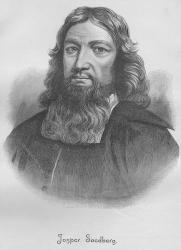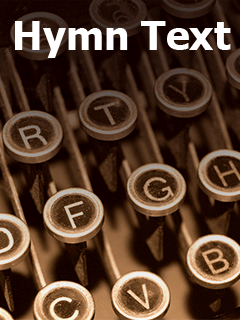Alterer (German): David Denicke
Denicke, David, son of B. D. Denicke, Town Judge of Zittau, Saxony, was born at Zittau, January 31, 1603. After studying philosophy and law at the Universities of Wittenberg and Jena, he was for a time tutor of law at Königsberg, and, 1624-1628, travelled in Holland, England and France. In 1629 he became tutor to the sons of Duke Georg of Brunswick-Lüneburg, and under father and sons held various important offices, such as, 1639, the direction of the foundation of Bursfeld, and in 1642 a member of the Consistory at Hannover. He died at Hannover, April 1, 1680 (Koch, iii. 237; Bode, p. 58). His hymns, which for that time were in good taste, and are simple, useful, warm, and flowing, appeared in the various Hannoverian hymnbooks, 1646-1659,…
Go to person page >Translator: Jesper Svedberg

Biship of Skara, Sweden. He was entrusted in creating the first book ever of Swedish hymns, known today as "Swedberg's Book of Hymns, printed in 1694. It was soon declared heretical by some, because it focused too much on good works and not enough on faith. The whole edition was revoked, however, not before some copies made their way to Swedish colonies overseas. A new edition was published containing about 500 hymns, 30 of which bore Swedberg's name as author or translator. Several of these are still in the modern Swedish Book of Hymns.
Go to person page >Alterer (Swedish): Johan Olof Wallin

Johan Olaf Wallin was born at Stora Tuna, in 1779, and early displayed his poetical powers. In 1805, and again in 1809, he gained the chief prize for poetry at Upsala. In the latter year he became pastor at Solna; here his ability as a preacher was so striking that he was transferred to Stockholm, in 1815, as "pastor primarius," a title for which we have no exact equivalent. In 1818 he was made Dean of Westeras, and set about the task of editing a revised hymn-book for the whole of Sweden. This task he completed in 1819, and published it as, Den Swenska Psalmboken, af Konungen gillad och stadfästad (The Swedish hymn-book, approved and confirmed by the King). To it he contributed some 150 hymns of his own, besides translations and recasting…
Go to person page >Author: Johann Heermann

Johann Heermann's (b. Raudten, Silesia, Austria, 1585; d. Lissa, Posen [now Poland], 1647) own suffering and family tragedy led him to meditate on Christ's undeserved suffering. The only surviving child of a poor furrier and his wife, Heermann fulfilled his mother's vow at his birth that, if he lived, he would become a pastor. Initially a teacher, Heermann became a minister in the Lutheran Church in Koben in 1611 but had to stop preaching in 1634 due to a severe throat infection. He retired in 1638. Much of his ministry took place during the Thirty Years' War. At times he had to flee for his life and on several occasions lost all his possessions. Although Heermann wrote many of his hymns and poems during these devastating times, his persona…
Go to person page >

 My Starred Hymns
My Starred Hymns





